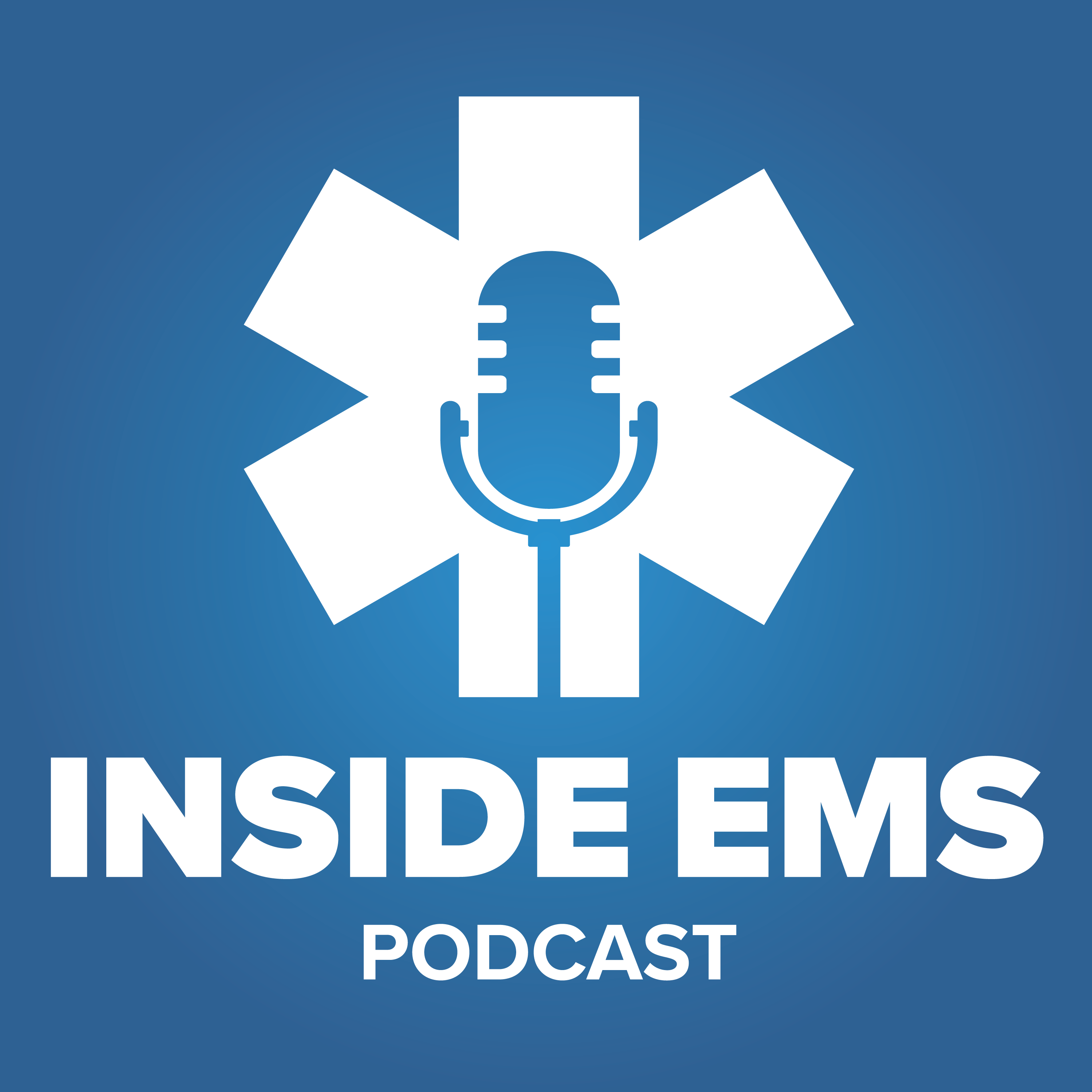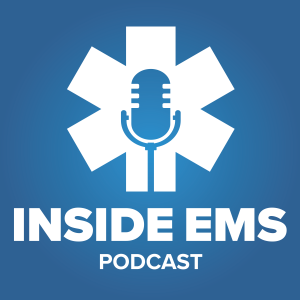
Keeping you on the pulse of what’s happening inside the EMS community. Catch up with Chris Cebollero and Kelly Grayson weekly as they discuss EMS life through good-natured banter and expert perspectives. Their vehicle for delivering the news and know how is that of two medics sitting on the truck between calls. Their mission is to make all listeners, EMS insiders.
Episodes

Friday Jun 07, 2024
Career progression: ‘A good paramedic should outgrow their protocols’
Friday Jun 07, 2024
Friday Jun 07, 2024
“If you're the smartest one in the room, you're in the wrong room.”
Education is the word of the day on this episode of Inside EMS, as cohosts Chris Cebollero and Kelly Grayson dissect the impact of higher learning on providers’ career longevity and advancement. Plus we dig into all this:
-
Starter EMS agencies. “Some agencies might just have to be the minor leagues, the starter programs and the feeders to the real EMS agencies."
-
Prioritizing your professional growth. “We're in charge of the career ladder. I shouldn't have to worry about my organization putting something in place for me to grow. They don’t owe that to me. It's my job to market myself and create the opportunity."
-
Big picture impact of higher education. “When people say, ‘I don't need an education to be a paramedic,’ they don't know what they don't know. It's not until you get a little older and a little wiser that you realize the value of that education."
This episode of Inside EMS is brought to you by Lexipol, the experts in policy, training, wellness support and grants assistance for first responders and government leaders. To learn more, visit lexipol.com.

Friday May 31, 2024
‘Where is your strength as an EMS provider?’
Friday May 31, 2024
Friday May 31, 2024
“Even after all these years of being in EMS, I still want to learn.” Flying solo this week, Chris Cebollero takes a note from EMS1 columnist Tim Nowak, walking listeners through his “11 keys to success for the rookie EMT.” Though directed at new EMTs, Cebollero makes the point that Nowak’s list of advice is really poignant for anyone at any point in their EMS career.
Listen to learn:
- The role ego plays on scene … and how to move past it
- How to test your quick-thinking reflexes and level-up
- The slow creep of complacency and how to avoid it
Top quotes
- "When someone needs you and needs your ability and needs your knowledge and needs your skill, you don't need to be looking for the OB kit."
- "Never settle for the minimum, whether it's the standard of patient care, compassion, continuing education hours."
- “You are going to make mistakes. You need to learn from your mistakes. You need to make sure that you don't do those mistakes again.”
This episode of Inside EMS is brought to you by Lexipol, the experts in policy, training, wellness support and grants assistance for first responders and government leaders. To learn more, visit lexipol.com.

Friday May 17, 2024
EMT partners: ‘The people that really make it happen’ on calls
Friday May 17, 2024
Friday May 17, 2024
“When your communication is intuitive … that’s what makes EMS an art for me.” This week, our cohosts discuss what makes a good EMT partner and a supportive paramedic mentor. The discussion was inspired by EMT-B Clay Gilman’s recent EMS1 poem submission, “To my medic, from your EMT.”
The conversation also touches on:
-
The use of BLS intercepts in place of paramedic intercepts
-
How empowering EMTs can provide staffing relief
-
Why EMTs should be taught to think above all else
This episode of Inside EMS is brought to you by Lexipol, the experts in policy, training, wellness support and grants assistance for first responders and government leaders. To learn more, visit lexipol.com.

Friday May 10, 2024
Friday May 10, 2024
This week on Inside EMS, MedStar’s Matt Zavadsky joins the show for the 10th time as a guest host to discuss potential changes to how the organization operates in the City of Fort Worth … as well as a change to Zavadsky’s personal career path. The pair also discuss:
- The four options on the table for transforming MedStar
- What a MedStar change means for the 13 surrounding cities it serves
- How the economics of EMS have changed since the pandemic
This episode of Inside EMS is brought to you by Lexipol, the experts in policy, training, wellness support and grants assistance for first responders and government leaders. To learn more, visit lexipol.com.

Friday May 03, 2024
Goodbye, pencil whipping: Reimagining drug tracking compliance
Friday May 03, 2024
Friday May 03, 2024
“We wanted to build something to solve the problem and help the paramedic, not hinder them.” Clive Savacool, CEO and founder of LogRx, joins the podcast this week to discuss preventing drug diversion/theft.
Host Christ Cebollero and Savacool discuss:
-
Who sets the tone for compliance accountability in an EMS organization
-
The practice of gatekeeping narcotics from “drug seekers”
-
Modernizing documentation practices to increase accuracy
-
The LogRx smartphone platform and solution for tracking narcotics and other drugs
This episode of the Inside EMS Podcast is sponsored by LogRx. Learn a better way to track your narcotics at LogRx.com.

Friday Apr 26, 2024
Friday Apr 26, 2024
Inside EMS cohosts Chris Cebollero and Kelly Grayson delve into a legal case out of New Jersey in this week’s episode, in which law enforcement officers and EMS providers were recently charged with the in-custody, in-ambulance death of a patient under the influence of bath salts.
The discussion also discusses a similar incident out of Colorado in which two paramedics and a police officer were convicted in the 2019 death of Elijah McClain after he was injected with ketamine.
Chris and Kelly share vulnerable moments from their careers when they regret not advocating for their patient in the face of law enforcement actions, plus we dig into all this:
-
The growing legal scrutiny of EMS practices
-
How to use de-escalation techniques to mitigate contentious situations with law enforcement partners
-
The ethical responsibilities of EMS providers
This episode of the Inside EMS Podcast is sponsored by LogRx. Learn a better way to track your narcotics at LogRx.com.

Friday Apr 19, 2024
Leadership styles: Progressive discipline vs. coaching culture
Friday Apr 19, 2024
Friday Apr 19, 2024
“Sometimes we made decisions and wound up getting corrective action where maybe a culture of coaching would have taught me to grow.”
Kelly Grayson puts the spotlight on fellow cohost Chris Cebollero this week as the pair discuss whether progressive discipline still has a place in EMS or if a move to a culture of coaching, as written about extensively by Chris, would have a more positive impact on retention rates, turnover, burnout and overall career satisfaction.
Top quotes
-
“Experience comes from mistakes and mistakes come from lack of experience.” – Chris Cebollero
-
"I've gotten enough progressive discipline, enough paper that I can wallpaper a small closet." – Chris Cebollero
-
“This isn’t about me wanting to fire you. This is about me wanting to make you the very best that you can be.” – Chris Cebollero
This episode of the Inside EMS Podcast is sponsored by LogRx. Learn a better way to track your narcotics at LogRx.com.

Friday Apr 12, 2024
‘A series of unfortunate events’: The danger of bias cascade in EMS
Friday Apr 12, 2024
Friday Apr 12, 2024
“Sometimes we make a decision, and it snowballs.” Our cohosts get vulnerable on this episode of the Inside EMS podcast, sharing times in their career when they suffered from cascade bias – using incorrect supplied or assumed information, which led to mistakes that compounded to the detriment of the patient. Have you experienced this in your career?
Plus, we dig into all this:
- How to enhance your decision-making skills during times of uncertainty
- Which U.S. Air Force acronym can help with bias reassessment
- How experience can work against providers when it comes to bias
This episode of the Inside EMS Podcast is sponsored by LogRx. Learn a better way to track your narcotics at LogRx.com.

Friday Mar 29, 2024
‘Sell the sizzle, not the steak’: How to engage and captivate EMS audiences
Friday Mar 29, 2024
Friday Mar 29, 2024
This week our cohosts are talking about everyone’s favorite activity: public speaking. While you may not love talking to a crowd, knowing how to effectively deliver a presentation is not just for leaders. Providers at all levels should know how to communicate on a complex topic to a group of people. And who knows more about expounding on complex EMS topics than Chris Cebollero and Kelly Grayson?
The pair highlight their extensive experience as educators and industry speakers, discussing:
- The key components of effective public speaking
- How to make presentations more dynamic
- Why you should be intimately familiar with your material
- Tips and tricks for new public speakers
This episode of the Inside EMS Podcast is sponsored by LogRx. Learn a better way to track your narcotics at LogRx.com.

Friday Mar 22, 2024
‘We have to battle hard’: EMS pain points and what it will take to fix them
Friday Mar 22, 2024
Friday Mar 22, 2024
In this week’s episode of the Inside EMS podcast, host Chris Cebollero and guest host Rob Lawrence delve into the dynamics of EMS leadership, legislative challenges and the pursuit of better reimbursement practices for EMS services. The conversation also digs into EMS on the Hill Day and how providers can impact legislation through advocacy.
Memorable quotes
- "We say, 'When is someone going to do something?' And really, the charge is, 'When is everyone going to step up and do something?'" — Chris Cebollero
- "We have to battle hard to increase our reimbursement, which therefore equates to income, which therefore equates to wages. It's not a case about we all want to go home in a Rolls-Royce.” — Rob Lawrence
- "To get things done in EMS, we actually have to be good at convincing our locally elected officials." — Rob Lawrence
- "The power of the folk out there, when they put their uniform on, when they get in front of these elected officials, is absolute." — Rob Lawrence
This episode of the Inside EMS Podcast is sponsored by LogRx. Learn a better way to track your narcotics at LogRx.com.
